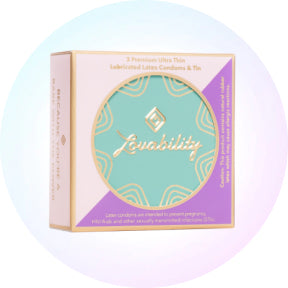A Sex Therapist's Tips For Reclaiming Your Sense Of Self In The Bedroom
Sex is supposed to be a source of relaxation, satisfaction, and connection. But for trauma survivors, pleasure after trauma can feel impossible.
Trauma—especially sexual trauma—can leave you feeling disconnected from your body. Depending on the event and its subsequent effects, physical intimacy can trigger feelings of shame, fear, numbness, anxiety, and even physical discomfort or pain rather than all the good feelings your anatomy was designed to experience.
But that doesn’t mean that pleasure is a lost cause.
Holly Wood, Ph.D. (c), AASECT-Certified Sex Therapist and Clinical Sexologist at Bedbible.com, has seen it firsthand: people who have experienced traumatic events can reclaim pleasure and learn to feel safe, secure, and deeply connected with bodies (and their partners) in the bedroom.
Here is her advice on how to do just that.
What Is Trauma — And How Can It Impact Our Sex Lives?
Trauma has received a lot of varying definitions over the past decade. But in its essence, trauma is how a person emotionally responds to a distressing experience.
While we tend to think of trauma as these major events like a car accident or a shooting, it can also be something subtler like childhood neglect or an emotionally abusive relationship. Any experience that leaves someone feeling scared and powerless can become traumatic if left unresolved. And if the trauma was sexual in nature or involved your genital area, it can make sex—or even thinking about sex—especially uncomfortable.
As a sex therapist who focuses on rediscovering pleasure post-trauma, most of Wood's clients come to her after experiencing sexual violence. But she says even seemingly minor events like unwanted sexual touch, coercive sex, birth, PAP smears, and even painful, consensual sexual experiences like losing your virginity can leave a person feeling unwelcome in their own body and make physical pleasure feel completely out of reach.
"Someone might have just experienced a negative interaction with sex that wasn't necessarily traumatic, but it causes the body to hold on to that fear," she says. "There's an anticipation that sex is going to be painful."
That anticipation, according to Wood, is the result of our bodies holding on to whatever trauma we've been through.
"We might not be thinking about them logically, but our body will remember things. It'll have physical responses to sensations that feel similar to or replicate the trauma."
Those post-trauma physical responses can include:
-- Involuntary muscle spasms
-- Freezing
-- Aggression and lashing out
-- Feeling the need to flee or run away from the situation
"If you're driving in a car and you notice the car in front of you slams on its brakes, you might pent up yourself because you have that anticipation that something might happen," Wood says. "That's what's happening mechanically a lot of times within the body. And again, it might not be a conscious understanding of the need to protect yourself."
In fact, the response might be so unconscious that you can't even recall what trauma your body is protecting you from. Wood says that she often works with clients who know they're having a bodily reaction to something, but they don't remember what caused it in the first place. Blocking out memories or even reconstructing them so they're not as painful is a common coping mechanism for trauma survivors.
"It allows us to continue to live our lives and build resilience," she explains, adding that it's not really necessary to remember all the details to reclaim pleasure. While every person—and every trauma—is different, she does have a few recommendations for regaining lost pleasure.
How To Reclaim Pleasure After Trauma
Slow and steady wins the race here. This process is a marathon, not a sprint—which means taking small steps and remembering that rediscovering physical intimacy takes time, patience, and a lot of self-trust.
Here are Wood's tips for taking the first steps.
Be Aware Of Your Triggers
Wood says that a major part of working with a new client is identifying their unique triggers and making sure that they have the skills to ground themselves with those triggers that inevitably arise.
While journaling is a great way to uncover the emotions and sensations that arise during sex, working with a therapist who specializes in whatever trauma you've experienced can help become aware of patterns that are stopping you from being present and enjoying intimate moments.
Rebuild That Mind-Body Connection
"A lot of times what happens is we experience these traumas, and then there's a disconnect between mind and body, so they're no longer in alignment," Wood said. "So a big part of the work is rebuilding that mind-body connection so that way you can more readily recognize when you're feeling safe in your own body."
The more you practice what it feels like to be safe in your body, the more easily you can recall that feeling when triggers pop up. Wood is a big fan of using grounding exercises to help clients re-establish that connection and create their own sense of safety.
"For example, say you're somebody who had a sexual trauma that happened when they were out at a bar. Can you build up the skills beforehand and then go out to a bar and go home and realize you're going to be safe?"
While the specific tools she recommends depend on the individual, she is a big fan of mindfulness meditation, breathwork, yoga, dance, and anything else that "can help you ground back into the present and reconnect with your body."
Take Back Control
Wood is currently deep in the middle of researching the benefits of using sex toys to alleviate sexual dysfunction and address PTSD among sexual trauma survivors. While she does think that addressing any PTSD is a crucial first step—"if you're having panic attacks going to the grocery store, we need to get that under control before we start focusing on sex"—she says her research is showing that survivors are benefiting from using sex toys to be in the driver's seat of their pleasure.
"A lot of participants describe sex toys as a way to engage in mindfulness," Wood says. "Focusing on the sensation of the water running over your vulva allows you to anchor yourself into your physical experience."
Another reason sex toys may be beneficial is because they act as a form of self-induced exposure therapy. You're in control of the environment, the pace, and the kind of sensations you want to experience. All of which can be a helpful way to regain trust in your body and relearn what's pleasurable to you.
Find Pleasure In Non-Sexual Activities
It might seem counterintuitive, but Wood says that re-cultivating pleasure through other means can be a great stepping stone to reclaiming pleasure in the bedroom.
"I'll encourage people to pick out a candle that smells good or touch a piece of fabric that feels good. Does sipping on a glass of wine taste pleasurable to you, or does nibbling on chocolate? It's okay to start with baby steps and work up to a space that's more explicit."
The idea here is to create a safe space for your pleasure—one that doesn't involve any type of pressure or performance. And if traditional sex toys are intimidating or even triggering, we encourage you to check out The WaterSlyde aquatic stimulator. It's a non-invasive water diverter that attaches to your bathtub faucet to deliver a soothing stream of pleasure-inducing water.
Rainey of @sexplained.med previously shared that The WaterSlyde should be "very helpful to victims of sexual trauma to get readjusted to the sensation of the clitoris, vulva, and genital arousal in general.” So if you're looking for a way to take back control of your pleasure and do it in the comfort of a nice warm bath, The WaterSlyde might be the perfect companion.
It may not happen overnight, but with time and dedication to self-care practices like these, you can reclaim the pleasure you deserve.
About The Author
Emily Blackwood is a freelance journalist committed to answering the plaguing question of what makes us truly happy. Turns out, it's a lot. Her work has been published in SELF, HuffPost, and YourTango. You can learn more here.
___________________________________________________
Medical Disclaimer: The information provided here is intended for educational and informative purposes only and is not intended to serve as medical or professional advice. If you have any concerns or questions about your health, you should always consult with a physician or other health-care professional.















